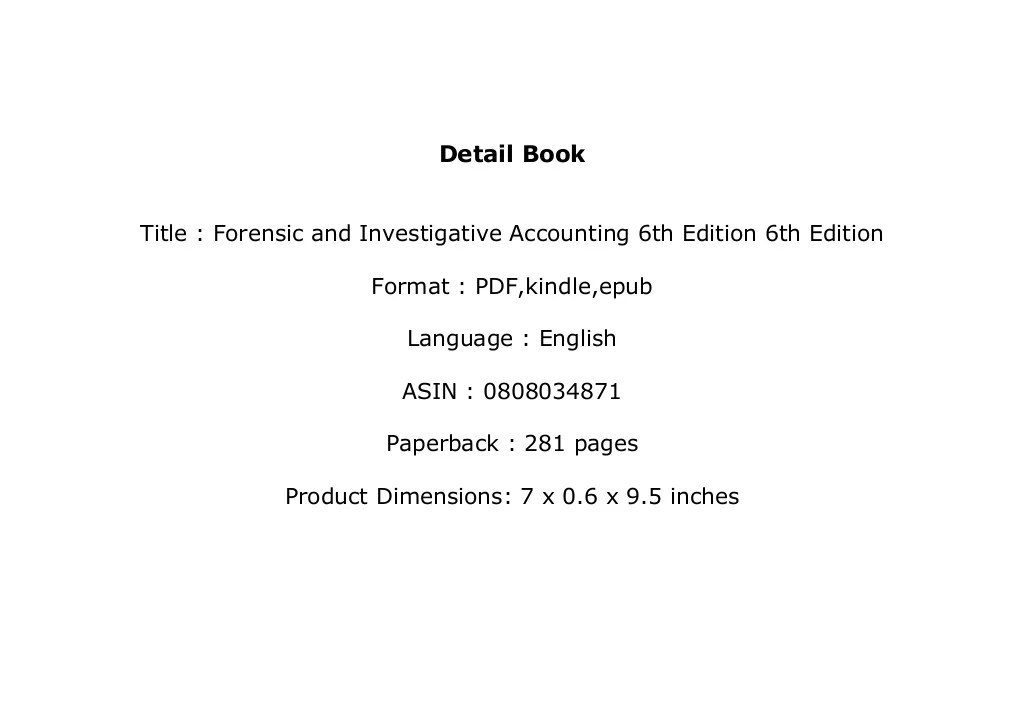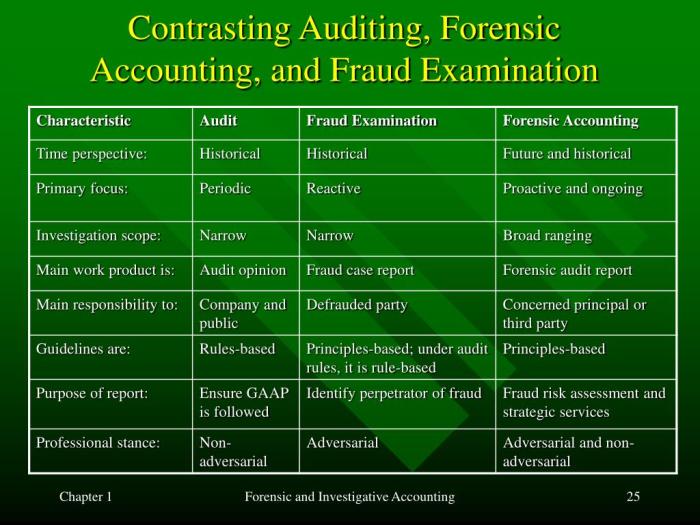Forensic and investigative accounting 10th edition – In the realm of forensic and investigative accounting, the 10th edition emerges as a beacon of knowledge, illuminating the intricate world of financial investigations. This revised and updated edition delves into the multifaceted aspects of this specialized field, providing readers with a comprehensive understanding of its principles, practices, and applications.
Forensic and investigative accounting has become increasingly vital in today’s complex business environment, where financial irregularities and fraudulent activities pose significant threats to organizations. This edition equips readers with the tools and techniques necessary to detect, investigate, and prevent financial crimes, ensuring the integrity and reliability of financial information.
1. Introduction: Forensic And Investigative Accounting 10th Edition
Forensic and investigative accounting is a specialized field of accounting that focuses on the investigation and analysis of financial information for legal or investigative purposes. It is a rapidly growing field due to the increasing incidence of fraud and other financial crimes.
Forensic and investigative accountants are often called upon to investigate allegations of fraud, embezzlement, money laundering, and other financial crimes. They may also be called upon to provide expert testimony in court proceedings or to assist in the recovery of stolen assets.
Examples of Forensic and Investigative Accounting Cases, Forensic and investigative accounting 10th edition
- Investigating allegations of fraud in a publicly traded company
- Tracing the flow of funds in a money laundering scheme
- Recovering stolen assets from a Ponzi scheme
2. Types of Forensic and Investigative Accounting Services
Forensic and investigative accountants provide a wide range of services, including:
- Fraud investigation and prevention
- Money laundering investigation
- Asset tracing and recovery
- Expert testimony
- Data analytics and visualization
The benefits of using forensic and investigative accounting services include:
- Early detection and prevention of fraud
- Recovery of stolen assets
- Expert testimony in court proceedings
- Improved financial reporting and compliance
3. The Forensic and Investigative Accounting Process

The forensic and investigative accounting process typically involves the following steps:
- Planning and scoping the engagement
- Collecting and analyzing data
- Interviewing witnesses and suspects
- Preparing a report of findings
- Testifying in court or other proceedings
The challenges of conducting forensic and investigative accounting engagements include:
- The need for specialized knowledge and skills
- The need to maintain objectivity and independence
- The need to comply with legal and ethical requirements
4. Tools and Techniques Used in Forensic and Investigative Accounting

Forensic and investigative accountants use a variety of tools and techniques, including:
- Data analytics and visualization
- Computer forensics
- Document examination
- Interviewing and interrogation
- Financial analysis
The benefits of using these tools and techniques include:
- Increased efficiency and accuracy
- Improved detection of fraud and other financial crimes
- Enhanced ability to present findings in a clear and concise manner
5. Reporting and Communication of Forensic and Investigative Accounting Findings

The reporting and communication of forensic and investigative accounting findings is a critical part of the engagement process. The report should be clear, concise, and well-organized. It should also be tailored to the audience, whether it is a client, a court, or a regulatory agency.
Effective reporting and communication can help to ensure that the findings of the investigation are understood and acted upon. It can also help to build trust and credibility with clients and other stakeholders.
Examples of Effective Forensic and Investigative Accounting Reports
- A report that clearly and concisely describes the findings of a fraud investigation
- A report that provides expert testimony in a court proceeding
- A report that helps a client to recover stolen assets
6. Ethical Considerations in Forensic and Investigative Accounting
Forensic and investigative accountants are subject to a number of ethical considerations, including:
- The need to maintain objectivity and independence
- The need to comply with legal and regulatory requirements
- The need to protect the privacy of clients and other stakeholders
The key ethical issues that forensic and investigative accountants face include:
- Conflicts of interest
- Confidentiality
- Objectivity
- Competence
7. Career Opportunities in Forensic and Investigative Accounting
Forensic and investigative accounting is a growing field with a wide range of career opportunities. Forensic and investigative accountants can work in a variety of settings, including:
- Public accounting firms
- Government agencies
- Corporations
- Non-profit organizations
The skills and qualifications needed to be a successful forensic and investigative accountant include:
- A strong understanding of accounting principles and auditing procedures
- Excellent analytical and investigative skills
- Strong communication and interpersonal skills
- A commitment to ethical behavior
FAQ Corner
What is the primary focus of forensic and investigative accounting?
Forensic and investigative accounting focuses on examining financial information to detect and prevent fraud, embezzlement, and other financial crimes.
What are the key skills required for a successful forensic and investigative accountant?
Forensic and investigative accountants require strong analytical, problem-solving, and communication skills, as well as a deep understanding of accounting principles and investigative techniques.
How can forensic and investigative accounting services benefit organizations?
Forensic and investigative accounting services can help organizations identify and mitigate financial risks, prevent fraud, and enhance the accuracy and reliability of their financial reporting.